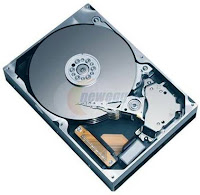My existing system has 23 Gb available out of 100 Gb total capacity, so I'm using about 77 Gb. Disk usage has grown from about 15 Gb in 1999 to 77 this year, which means that it grew by a factor of five in the intervening eight years. That suggests I should buy five times the amount of disk that I am now using, or about 400 Gb, to last the next eight years. Maybe so.

But maybe not. New technology is on the horizon. It is already possible to buy a 64 Gb flash drive with no moving parts for about $900. How soon will the price/performance curve of flash or some even-better technology approach that of moving-head disk drives? Probably sooner than later.
For now I'm going with 320 Gb drives, a relatively mature technology, available from several manufacturers, with modest power and heat dissipation needs. That's a safe choice.
So whose drives? To simplify things I've narrowed the field to three manufacturers: (1) Samsung, (2) Seagate, and (3) Western Digital, in alphabetical order. Hitachi and Maxtor make appropriate drives too, as do other manufacturers, but I've seen nothing to indicate that any of those would be a better choice than the best of the first three. If you have other information, please comment. The drives will all have:
- 320 Gb capacity.
- SATA 3.0 Gb/s interface.
- 7200 RPM and attending latency.
- Average seek time less than 10 ms.
- 16 Mb cache.
| Brand | Model# | Price | Warranty | Five* | Comments |
| Samsung | HD321KJ | $74.99 | 1 yr | 80% | 20 |
| Seagate | ST3320620AS | $79.99 | 5 yr | 76% | 1887 |
| Western Digital | WD3200AAKS | $74.99 | 3 yr | 80% | 144 |
The Five* column is the percentage of reviewers who gave the drive five stars out of five, i.e. the best possible rating. I realize that some people rarely give the highest rating to anything, so the system may be biased, but I also saw a comment from a reviewer who gave four stars for a drive which was dandy until it failed after one day's use. So it balances out.
In any case the reviewers' ratings don't give much guidance, all between 76% and 80%. The Seagate drive is by far the most popular, but comments indicate that it has been received dead on arrival in many recent cases. One commenter said that it is made in China. Further, and significantly, many reviewers comment that the Seagate drive is noisy. I don't like that, and I'm leaning a bit toward WD. I wonder where theirs are made?
Suppliers like NewEgg have a 30-day return policy on drives (probably on everything), so I suppose I won't be buying any drives until the rest of the system is nearly assembled and ready to test. By then things may have changed. Perhaps Seagate will correct their quality problem, or prices will change enough to make one drive more attractive on that basis.



